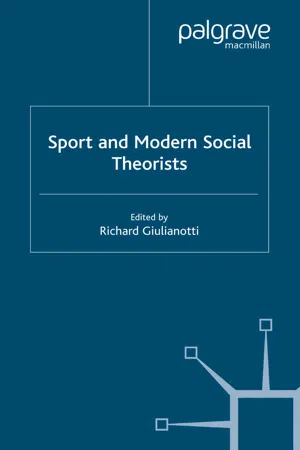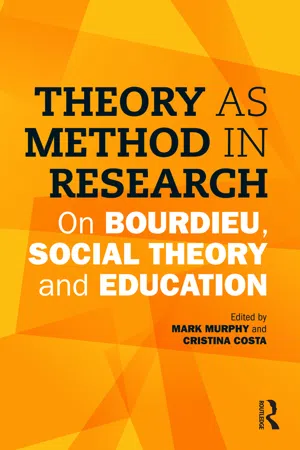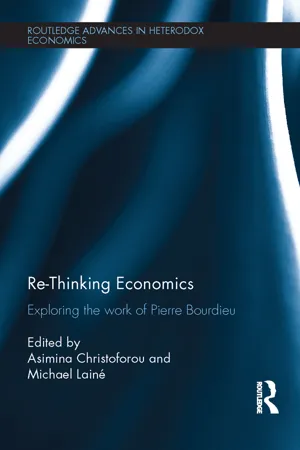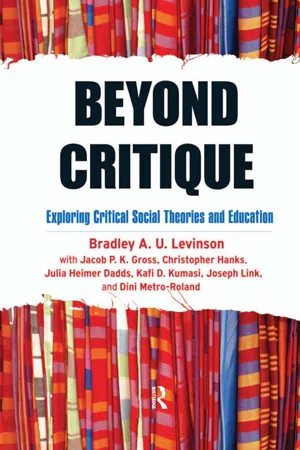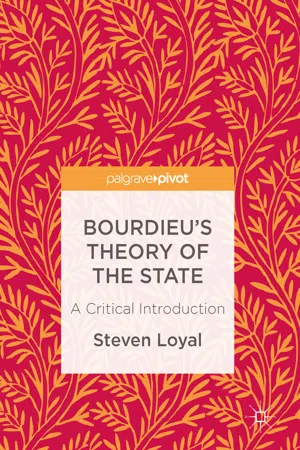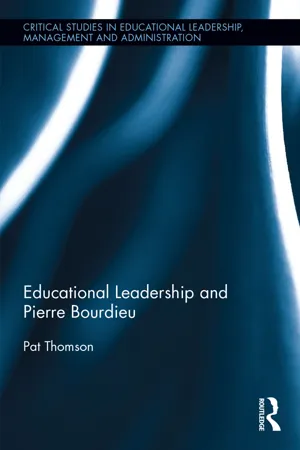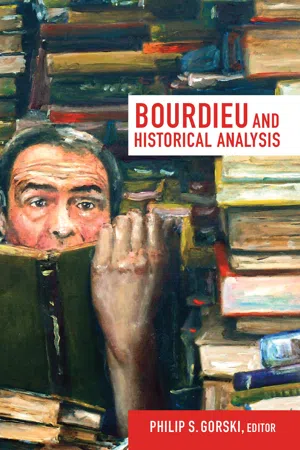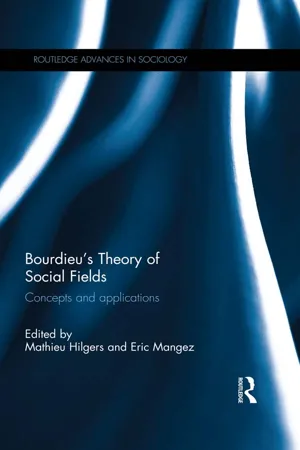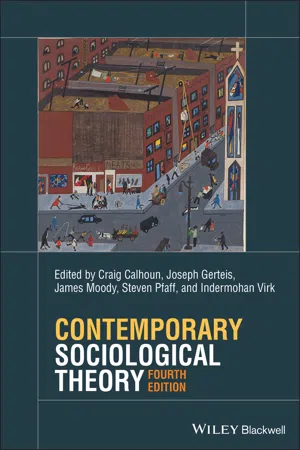Social Sciences
Pierre Bourdieu
Pierre Bourdieu was a prominent French sociologist known for his work on cultural capital, habitus, and social reproduction. He emphasized the role of social structures and power dynamics in shaping individuals' behaviors and beliefs. Bourdieu's theories have had a significant impact on the study of social inequality, education, and cultural practices.
Written by Perlego with AI-assistance
Related key terms
1 of 5
11 Key excerpts on "Pierre Bourdieu"
- eBook - PDF
- Richard Giulianotti(Author)
- 2004(Publication Date)
- Palgrave Macmillan(Publisher)
161 10 Pierre Bourdieu and the Sociological Study of Sport: Habitus, Capital and Field Alan Tomlinson Introduction Pierre Bourdieu was one of the most influential social theorists of his generation, both in his home country France and throughout the international sociological community. For close to half a century he researched a range of anthropological and sociological topics and, as a consequence, has had an enormously influential impact across the academic world. His initial specialism was in anthropology, and his publications in the early 1960s addressed issues concerning gender relations and unemployment in peasant cultures in Algerian society, and were published in rural studies and sociology of work journals. His broadening interests reflected his commitment to a wide-ranging soci- ology of culture, in the realms of education, art, the media, sport and around the general theme of symbolic power. His initial piece on sport and social class (Bourdieu, 1978) was one of the first commentaries by a major social theorist, apart from the oeuvre of Norbert Elias and his collaborator Eric Dunning, to take sport as a serious sociological issue. In his major study of taste and consumption, Distinction: A Social Critique of the Judgement of Taste (Bourdieu, 1986), first published in 1979, sport is acknowledged as a major focus of sociological analysis, and his conceptualization of the sociological significance of sport – as both institution and practice – has since influenced many theoretical and empirical investigations into the social and cultural significance and representation of bodily practices, not solely in sport but also in educa- tion, arts, and the media. Any cursory trawl of the more sociologically informed and critical sociological literature on sport, culture and society will reveal the range of influences and applications. John Hargreaves (1987, p. 154), in his - eBook - ePub
Theory as Method in Research
On Bourdieu, social theory and education
- Mark Murphy, Cristina Costa(Authors)
- 2015(Publication Date)
- Routledge(Publisher)
Bourdieu and Passeron also established relevant links between education, society, and culture not only through the notion of capitals – specifically cultural capital – but also through the concept of habitus, and the dispositions individuals acquire throughout their life trajectories, which orient their strategies towards social and professional practices. They describe the difference between primary and secondary habitus. According to them, the ‘habitus acquired in the family [primary] forms the basis of the reception and assimilation of the classroom message, and the habitus acquired at school [secondary] conditions the level of reception and degree of assimilation of … any intellectual message’ (Bourdieu and Passeron, 1979 [1990], pp. 43–4). Hence, the Bourdieuian perspective understands education mainly as a system of reproduction of social practices and social privileges, with social classes being defined not only in relation to the position they occupy in the field, but also, and above all, through the cultural capital and habitus associated with that very same position. This is naturally converted into forms of symbolic power, such as distinction and the sense of identity individuals confer on their position in the field.Later in his career Bourdieu studied distinction in taste, attitudes and social positions of social agents. In his book Distinction : A social critique of the judgement of taste (1984), he reflects on the economies of practices and cultural goods through ‘the role played by the education system in mediating the relations between the status hierarchies associated with different tastes and cultural preferences on the one hand, and the organization and reproduction of the occupational class, on the other’ (p. xx).At the core of Bourdieu’s argument is the idea that individuals’ dispositions are (re)produced in relation and in response to the social, economic and cultural structures on which agents operate and with which they identify themselves or detach themselves from. As Bourdieu concludes, ‘social identity is defined and asserted through difference’ (ibid., p. 172), with education playing a role in reproducing such differences.In Homo academicus - eBook - PDF
- Anthony Elliott, Bryan S Turner, Anthony Elliott, Bryan S Turner(Authors)
- 2001(Publication Date)
- SAGE Publications Ltd(Publisher)
In con-trast, to the sociologist, Bourdieu's work is perhaps most striking for its interweaving of ethnographic observation alongside theoretical interpretations from Marx, Durkheim and Weber. When he returned to France, he was to work in lyce Âes and at the University of Lille. Bourdieu subsequently returned to Paris in 1964, to organize research at the L'E Â cole Pratique des Hautes E Â tudes, under the aegis of Raymond Aron. Here he developed a team studying education, which produced a series of books on students and the school. When, in 1968, the May events had student as well as factory demonstrations at their centre, the account in Reproduction of the role of education as a distinctive modern legitimating myth became one of the powerful catalysts for change. Throughout his career, Bourdieu has undertaken studies of issues marginalized by sociology ± taste, photography (Bourdieu et al., 1990), haute couture, academic life ± so as to raise the most profound questions in the philosophy of action (1990a; Pinto, 1998: 113). His dis-tinctive method is to break with the abstract or `theoreticist' approach to ques-tions of social reality (freedom, necessity, law, etc.). Instead, he resorts to social science, deploying a technology of prob-ability statements in order to show the objective structures within contemporary French society (the greater likelihood, for example, of social science academics being women, ethnic minorities or from the subordinate class relative to other disciplines, 1988a). Armed also with studies of agents' subjective interpretation , Bourdieu's distinctive approach shows how structures are meaningfully incorpo-rated into agents' most deep-rooted dispositions in the form of anticipated outcomes over time. Perceived outcomes direct psychological investments and govern expenditures of energy in the broadest sense -in turn reinforcing or further weakening existing structures. - eBook - ePub
Re-Thinking Economics
Exploring the Work of Pierre Bourdieu
- Asimina Christoforou, Michael Lainé, Asimina Christoforou, Michael Lainé(Authors)
- 2014(Publication Date)
- Routledge(Publisher)
Capital in this sense is related to a set of ‘economic’ concepts: ‘accumulation’, ‘conversion’, ‘investment’, ‘profit’ and also ‘exchange’. The systematic use of these concepts extends the realm of economic categories substantially and has therefore been criticised (for example, by Caillé or Favereau). But this ‘Bourdieuconomics’ (Svendsen and Svendsen 2003) can also be seen as an attempt to unify the social sciences without reducing all social behaviours to economic interests. This is possible provided they are used in connection with a theory of practice (associated to the concept of habitus) and a theory of multidimensional social interests and structures (associated to the concept of field).HabitusAround 1966, while writing about Panofsky’s analysis of Gothic architecture (Bourdieu 1967), Bourdieu shifted from the Weberian notion of ethos (enlarged to social classes) to the concept of habitus, used in order to interpret individual’s practices without losing their collective inscription. Habitus is the central concept which allows Bourdieu to propose an alternative to rational action theory (RAT). It is a system of dispositions, which are socially produced and reproduced and which tend (in a probabilistic and not deterministic way) to structure the representations, the actions, the ‘tastes’, etc., of individuals according to their various social experiences. Habitus is also the key to understanding the stability of social inequalities. Inequalities not only rely on economic assets, but also on the distribution of the diverse forms of non-economic capital. Through the habitus, these assets are deeply ‘internalised’, ‘embodied’, hence they are largely made unconscious and ‘naturalized’.Class habitus, that is, the dispositions developed by belonging to a certain social class, are related to ‘culture’ and ‘education’, not only to material living conditions, and to the global economic system, which favours particular dispositions, like ascetism or consumerism. In a capitalist society, habitus tends to be oriented toward economic rationality. - eBook - ePub
Beyond Critique
Exploring Critical Social Theories and Education
- Bradley A. Levinson, Jacob P. K. Gross, Christopher Hanks, Julia Heimer Dadds, Kafi Kumasi, Joseph Link(Authors)
- 2015(Publication Date)
- Routledge(Publisher)
She finds that they experience various forms of exclusion based on their gendered habitus and the forms of social and cultural capital that are implicitly valued. Ultimately, they find, in Taylor’s words, “the future that fits” their adjusted expectations (Taylor 2005 ; Morrison 2008). And in his book Producing Success: The Culture of Personal Advancement in an American High School (2009), educational anthropologist Peter Demerath uses Bourdieu’s concepts to understand how students at this high-achieving school draw upon their middle-class cultural capital and habitus to compete with one another and drive themselves to “advance” as much as possible—often at the expense of others, and even at the expense of their own broader learning and well-being. Finally, recently a vigorous literature on educational policy formation and the politics of educational reform and credentialing has drawn on Bourdieu’s framework. The concept of field, in particular, seems to inform the critical policy literature: The concept enables Eran Tamir to critically examine the power dynamics of teacher education and certification reform in the state of New Jersey, and it inspires Shaun Rawolle and Robert Lingard to develop an account of the local mediation of global policy discourses (Rawolle and Lingard 2008 ; Tamir 2008). In this sort of work, social fields are theorized as providing the arena of practice in which policy implementation unfolds. Theory and Educational Scholarship: A Closer Examination By examining more closely a small set of Bourdieu-inspired educational studies, we may better appreciate the analytic power of his concepts. In particular, we can see the seemingly intractable power of privilege, as well as the subtlety with which domination and inequality may be reproduced. We may be able to see how there is a constant work —the work of social practice—involved in establishing and reproducing domination - eBook - PDF
Bourdieu's Theory of the State
A Critical Introduction
- Steven Loyal(Author)
- 2017(Publication Date)
- Palgrave Macmillan(Publisher)
CHAPTER 2 Bourdieu’s Intellectual Biography Abstract This chapter outlines Bourdieu’s intellectual biography. It con- tends that his work can be understood in terms of a world-view. It then places his writings within the intellectual and political context within which they emerged. It argues that his work can be understood in terms of five major overlapping phases. Finally, it outlines and summarises his most important theoretical concepts, including habitus, field, capital, strategies and the economy of practices. Keywords World-view Á Habitus Á Field Á Capital Á Practices Á Symbolic power Born 1st August 1930, in Lasseube, a small village in the South Western Pyrenees, the son of a peasant who subsequently became a postal worker, Bourdieu was raised in a Béarnese (a Gascon dialect) speaking home. After studying at the lycèe in Pau followed by the Lycèe Louis-le-Grand in Paris, he gained entrance to the prestigious École Normale Supérieure, where he studied an equally prestigious subject, philosophy. Following his agrégation in 1954, he began work teaching in a provincial lycèe in Moulin. In 1954, he started but later abandoned a thesis under the super- vision of George Canguilhem on ‘Temporal structures of affective life’, before being reluctantly conscripted into the army in October 1955 and sent to Algeria during the Algerian War of Independence (1954–1962) at © The Author(s) 2017 S. Loyal, Bourdieu’s Theory of the State, DOI 10.1057/978-1-137-58350-5_2 7 the age of 25. Posted in an air force unit of the military staff in the Chelif valley, he was later moved to the Service de Documentation et d’Information of the Gouvernement Général. - eBook - ePub
- Pat Thomson(Author)
- 2016(Publication Date)
- Routledge(Publisher)
Bourdieu’s notion of capitals, in particular social capital, often gets conflated with another sociological use of the same term, that popularised by Robert Putnam (1993, 2000). Putnam proposed social capital as a kind of ‘glue’ that held societies together. Nations could be judged on the quantity of ‘bridging’ (vertical ties between social strata) and ‘bonding’ (horizontal ties between the same social strata) social capital that existed. This version of social capital is a normative concept amenable to quantification and comparison between locations, as well as to deliberate policy interventions designed to build bonds and networks (Baum, Palmer, Modra, Murray, & Bush, 2000; Sirianni & Friedland, 1995; World Bank Social Capital Initiative, 1999). It is important to distinguish this view of social capital from the Bourdieusian concept (see Edwards, 2004; and Portes, 1998, for further explanation). Bourdieu’s social capital denotes the use and exchange of associational ties between positions in fields. Social capital is variously advantageous in field ‘games’ depending on its volume and type and on the specific game being played.Bourdieu proposed that the game in each field was to acquire the capitals that are specific to it. At stake in the field of education are institutionalised symbolic capitals, specific knowledges which take the form of hierarchically organised qualifications. School certificates and university degrees are a proxy for cultural capital, and they can be converted in markets into economic capital and in networks to social capital. But there is more at stake in education than just qualifications. Educational institutions do more than impart knowledge. They offer various opportunities for students to be and become particular kinds of people, agents possessed of embodied cultural capital and immersed in particular social settings. The kinds of institutionalised and embodied cultural and social capital accrued in the field of education are, of course, not evenly or equitably distributed.To take this a little further, we need to address another of Bourdieu’s key concepts.Habitus
Habitus is a difficult concept to both grasp and explain. If fields and capital are Bourdieu’s way of discussing what many other social scientists called social structures, habitus is his approach to reconciling the structure-agency quandary. As a social scientist, Bourdieu did not believe in free will. He believed that social processes, institutions and thought systems framed what people did (Bourdieu, 1984). But he did not accept an explanation popular with many of his French peers, namely that what people did was ultimately dictated by the needs of the economic system, and their belief in free will and choice was simply a false consciousness inculcated and supported by various cultural and social apparatus (e.g. Althusser, 1971). Bourdieu did not accept that society was made possible through dominant ideologies which worked hegemonically to maintain control (Eagleton, 1991). He rejected this structuralist view, as did his contemporary Michel Foucault. Both Bourdieu and Foucault sought to explain how ‘the social’ worked through persons and institutions in ways that were not inexorably predetermined but that were nevertheless framed in space/time (see Murphy, 2013). - eBook - PDF
- Philip S. Gorski(Author)
- 2013(Publication Date)
- Duke University Press Books(Publisher)
This was his approach to problems of social di√erentiation. It led him to questions about the historical genesis and structure of such fields and to further development of his account of the forms of capital and their convertibility. In addition to the book-length works on education and art, Bourdieu published substantial articles on the religious, scientific, philosophical, and juridical fields. In these and other investigations he laid the basis for a general theory of fields as di√erentiated social microcosms operating as spaces of objective forces and arenas of strug-gle over value that refract and transmute external determinations and inter-ests. This became increasingly a theory of the distinctive nature of modern 50 craig calhoun society as ‘‘fielded’’ society, organized by the ways in which fields worked internally, related to each other, and mediated the influences of state and market. This took Bourdieu into the study of longer-term historical transforma-tions—for example, as the modern French religious field was shaped by a long Catholic history, the Protestant Reformation, the creation of a state church and secular opposition to it. In this connection he introduced the notion of ‘‘struc-turation’’ (later taken up by Anthony Giddens) to call attention to the fact that cultural and social structures were always incompletely solidified and hence potentially changing (Bourdieu 1991c). Fields represent Bourdieu’s specifica-tion of what Max Weber called the di√erent value-spheres of modern society. But he sees these relationally, and always as objects and sites of struggle. Bourdieu’s initial engagement with fields focused largely on their conserva-tism and especially the way in which their actual operation could undercut the universalism of much modern ideology. Modern states and markets both unified society and presented individuals as equal in their rights to property and political subjectivity. - eBook - PDF
- Michael Grenfell(Author)
- 2010(Publication Date)
- Continuum(Publisher)
Such properties would eventually be defined in terms of capital , or what is symbolically valued within a particular field context. Regions are then ‘cut up’ to see the operation and placing of a range of social groupings . These groupings may be of any kind – race, gender – although, at least in his work in educa-tion and culture, occupation was a major classifier, names and clusters of occupations being defined in terms of criteria and affinities, and the way they were distributed across the range of categories. Bourdieu further argues that in his empirical studies, the major ‘primary’ principles of differentiation need to be attributed to both the volume and the particular configuration of (cultural, social and economic) capital . In other words, indi-viduals and groups define themselves by how much capital they hold and the profile of capital types within that holding. A further significant factor is the social trajectories of individuals and groups. In this way, social group-ings ‘on paper’ can be related to what exists in reality. To the extent to which various individuals hold similar capital volumes and capital con-figurations (that is, share material conditions) in conjunction with others, they will constitute a homogeneous, and thus identifiable, group. They share similar positions in the overall structure of the social space , and thus also share similar habitus , and consequent dispositional characteristics. This chapter has sought to interweave Bourdieu’s theory of practice with his own biography, intellectual background and the socio-historic context in which he found himself. A number of influences can be discerned. Among these, Bourdieu’s own language experience is worth noting. Clearly, his childhood in the Béarn, and the language he spoke there, led to clashes 34 Bourdieu, Language and Linguistics in his early years in schooling, especially in the distinction between his native language and accent, and that of education. - eBook - ePub
Bourdieu's Theory of Social Fields
Concepts and Applications
- Mathieu Hilgers, Eric Mangez, Mathieu Hilgers, Eric Mangez(Authors)
- 2014(Publication Date)
- Routledge(Publisher)
Algérie 60. Structures économiques et structures temporelles . Paris: Éditions de Minuit (translated as 1979b).- Bourdieu, P. 1977c. ‘Sur le pouvoir symbolique’. Annales E.S.C ., 32(3), 405–411 (translated as 1977d).
- Bourdieu, P. 1977d. ‘Symbolic Power’. In D. Gleeson (ed.), Identity and Structure: Issues in the Sociology of Education . Driffield: Nafferton Books, 112–119.
- Bourdieu, P. 1977e. Outline of a Theory of Practice . Cambridge: Cambridge University Press.
- Bourdieu, P. 1978. ‘Sur l’objectivation participante’. Actes de la recherche en sciences sociales , 2/3, 67–94.
- Bourdieu, P. 1979a. La Distinction. Critique sociale du jugement de gout . Paris: Éditions de Minuit (translated as 1984b).
- Bourdieu, P. 1979b. Algeria 1960 . Cambridge: Cambridge University Press; Paris: Éditions de la Maison des Sciences de l’Homme.
- Bourdieu, P. 1980a. Le sens pratique . Paris: Éditions de Minuit (translated as 1990b).
- Bourdieu, P. 1980b. Questions desociologie . Paris: Éditions de Minuit (translated as 1993c).
- Bourdieu, P. 1981. ‘La représentation politique. Éléments pour une théorie du champ politique’. Actes de la recherche en sciences sociales , 36/37, 3–24.
- Bourdieu, P. 1982. Leçon sur la leçon . Paris: Éditions de Minuit (translated as ‘A Lecture on the Lecture’ in 1990c, 177–198).
- Bourdieu, P. 1983. ‘The Field of Cultural Production, or: The Economic World Reversed’. Poetics , 12(4/5), 311–356.
- Bourdieu, P. 1984a. Homo Academicus . Paris: Éditions de Minuit (translated as 1988a).
- Bourdieu, P. 1984b. Distinction: A Social Critique of the Judgement of Taste . London: Routledge; Cambridge, MA: Harvard University Press.
- Bourdieu, P. 1984c. ‘Espace social et genèse des classes’. Actes de la recherche en sciences sociales , 52–53, 3–12 (translated as 1985).
- Bourdieu, P. 1985. ‘The Social Space and the Genesis of Groups’. Theory and Society , 14(6), 723–744.
- Bourdieu, P. 1986. ‘La force du droit. Eléments pour une sociologie du champ juridique’. Actes de la recherche en sciences sociales
- eBook - PDF
- Craig Calhoun, Joseph Gerteis, James Moody, Steven Pfaff, Indermohan Virk, Craig Calhoun, Joseph Gerteis, James Moody, Steven Pfaff, Indermohan Virk(Authors)
- 2022(Publication Date)
- Wiley-Blackwell(Publisher)
Editorial material and organization © 2022 John Wiley & Sons Ltd. Published 2022 by John Wiley & Sons Ltd. Chapter 18 The Field of Cultural Production, or: The Economic World Reversed* [1983] Pierre Bourdieu Preliminaries Few areas more clearly demonstrate the heuristic efficacy of relational thinking than that of art and literature. Constructing an object such as the literary field 1 requires and enables us to make a radical break with the substantialist mode of thought (as Ernst Cassirer calls it) which tends to foreground the individual, or the visible interactions between individuals, at the expense of the structural relations – invisible, or visible only through their effects – between social positions that are both occupied and manipulated by social agents, which may be isolated individuals, groups or institutions. There are in fact very few other areas in which the glorification of “great men,” unique creators irreducible to any condition or conditioning, is more common or uncontroversial – as one can see, for example, in the fact that most analysts uncritically accept the division of the corpus that is imposed on them by the names of authors (“the work of Racine”) or the titles of works (Phèdre or Bèrènice) . To take as one’s object of study the literary or artistic field of a given period and society (the field of Florentine painting in the Quattrocento or the field of French literature in the Second Empire) is to set the history of art and literature a task which it never completely performs, because it fails to take it on explicitly, even when it does break out of the routine of monographs which, however interminable, are necessarily inadequate (since the * Originally translated from French by Richard Nice. Pierre Bourdieu, pp. 312–13, 315–16, 319–26, 341–6, 349–50, 353–6 from “The Field of Cultural Production, or: The Economic World Reversed,” Poetics 12: 4–5 (1983). Reproduced with permission of Elsevier.
Index pages curate the most relevant extracts from our library of academic textbooks. They’ve been created using an in-house natural language model (NLM), each adding context and meaning to key research topics.
